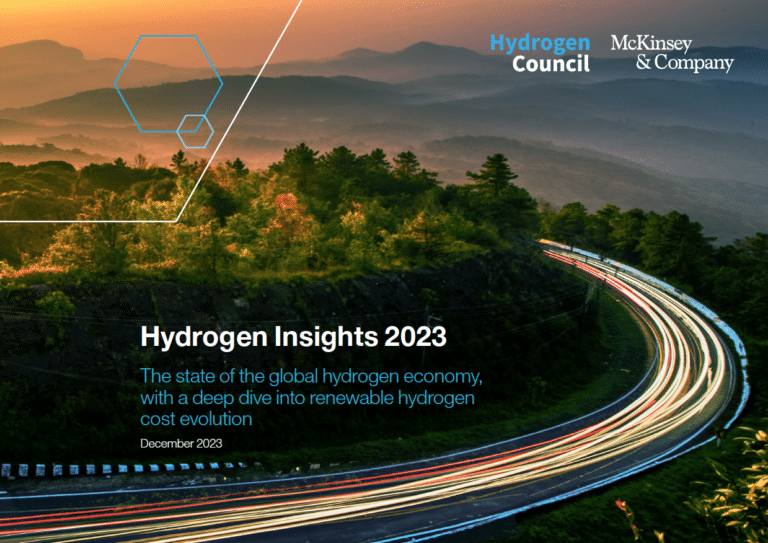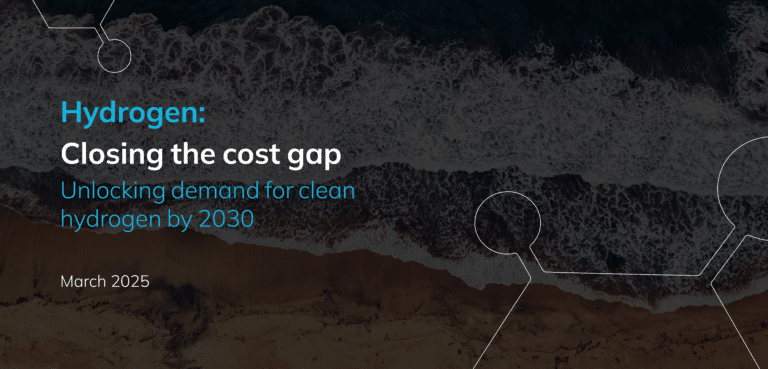December 12, 2023
Hydrogen Insights 2023 December Update is the latest update on the global hydrogen economy from the Hydrogen Council and McKinsey & Company. It summarizes the current state of the global hydrogen sector and actual hydrogen deployment, with a deep dive into renewable hydrogen cost evolution.
It represents a collaborative effort to share an objective, holistic, and quantitative perspective on the status of the global hydrogen ecosystem.
Executive Summary
- Hydrogen will play a crucial role in decarbonizing hard-to-abate sectors, enable the at-scale transport of energy to resource-constrained regions, and enable a clean and resilient energy system. Its deployment is at an inflection point – on one hand there are tailwinds such as a growing and gradually maturing pipeline of projects and supportive decarbonization regulation. On the other hand, there are headwinds: cost increases, project delays, continued regulatory uncertainty, and higher financing costs.
- The project pipeline is growing, with over 1,400 projects announced across all regions (up from about 1,040 in the previous publication), equaling USD 570 billion investments (previously USD 435 billion) and 45 million tons per annum (Mt p. a.) of clean hydrogen supply announced through 2030 (previously 38 Mt p. a.). Europe shows the largest number of projects (540), followed by North America (248). A quarter of projects with known commissioning date has progressed past final investment decision (FID), representing 7% of the total announced investments. Investments are maturing, with USD 110 billion in front-end engineering and design (FEED) and beyond (up from USD 75 billion), with 60% growth in investments undergoing FEED. Electrolysis deployment globally has shown similar growth, passing the 1 gigawatt (GW) mark (up from 0.7 GW previously), with about 12 GW capacity having passed FID.
- The regulatory landscape overall is evolving. For instance, support is materializing via production tax credits (PTC) and financial support for hydrogen hubs in the US, renewable hydrogen mandates in the Renewable Energy Directive (RED III) in Europe, or contracts for difference (CfD) in Japan. However, regulatory uncertainties remain, such as the definition of requirements to receive the US Inflation Reduction Act (IRA) PTC and the implementation of RED III in EU member states, implying these policies have not yet fully impacted the market.
- The clean hydrogen industry is facing headwinds. Costs and cost expectations have risen substantially, particularly for renewable hydrogen. The estimated levelized cost of producing renewable hydrogen (LCOH) is about 4.5 to 6.5 USD per kilogram (USD/ kg) if built today, up by 30% to 65%. Multiple factors have caused this increase – higher labor and material costs, higher cost for building the balance of electrolyzer plants, 3 to 5 percentage points higher cost of capital, and an increase of renewable power cost by more than 30%. However, the cost of producing renewable hydrogen is expected to decline to 2.5 to 4.0 USD/kg towards 2030, driven by advancements in electrolyzer technology, manufacturing economies of scale, design improvements, and reduction in renewable power cost.
- The headwinds have caused a slower development of the global hydrogen industry than had been previously expected. Such hurdles are reflected in, for instance, a 10% drop in announced clean hydrogen supply through 2025. Concerted action of industries and governments will likely be needed to further global clean hydrogen growth, facilitating additional decarbonization.
View and download the full report
Read the press release

Want to have the most up-to-date hydrogen market data and insights?
This report is accompanied by Hydrogen Insights, a paid subscription-based platform that will provide a regularly updated, global perspective on hydrogen investment momentum, market development, and cost competitiveness. The paid service is available for non-members of the Hydrogen Council. To subscribe and for more information, contact the Secretariat – secretariat@hydrogencouncil.com.



